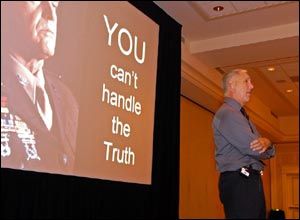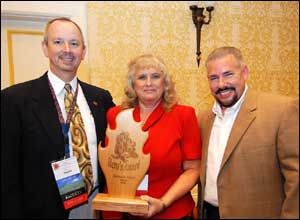By Maveric Vu
EMS1 Staff
 Photo courtesy of Ray Kemp, 911 Imaging Dr. Baxter Larmon gives his keynote speech at the 13th NAEMSE Symposium. |
ST. LOUIS — Clinical-based research and the need for EMS to push forward with implementing research in the field were stressed at the 13th annual National Association of EMS Educators Symposium in St. Louis.
The event — which featured the motto, “Gateway to Education” — offered a wide range of lectures and presentations, focusing on such topics as online instruction, utilizing simulations in the classroom, and clinical education standards.
EMS1 columnist Louis Molino said the symposium took a grass roots approach to educating EMTs, featuring a good mix of both academic and real world topics.
“The bulk of EMS is done at a grass roots level,” said Molino, an EMS consultant and an emergency services instructor based in Bryan, Texas. “It’s been done in the street and in ‘the back of the bus.’ There is a disconnect between academia and street providers.”
According to Molino, academic research does make a difference to the average medic – it just takes time for the information to filter down.
“There was a lot of emphasis on research, which is one thing that has always been my motivation in EMS,” said Jeffrey Lindsey, assistant professor of emergency medicine at George Washington University. “We need to be doing more research.”
Lindsey, a retired fire chief, said there were two fundamental things that he extracted from the symposium: the push to get the street provider to get involved in their own research, and the motivation to mobilize NAEMSE research efforts.
Lindsey highlighted the keynote speech by Dr. Baxter Larmon, from the University of California, Los Angeles, as a memorable look at the past, present and future of EMS.
“Looking at EMS in general, physicians have been the ones driving the research,” he said. “The EMS profession really needs to start doing the research.”
 Photo courtesy of Ray Kemp, 911 Imaging The 2008 Heroes Award was given to Debra Akers, center, from Va. |
The symposium, which took place Sept. 10 - 15, also presented awards to providers who have achieved excellence in the industry. The 2008 Heroes Award went to Debra Akers from Va. The James O. Page Scholarship Award was given to Jonathan Schaeffer from Calif. The new International Scholarship Award went to Christopher MacPherson from Australia. EMS pioneer James Page, who died in 2004, was honored with the Fallen Hero award.
Lindsey said the presentation by the international scholarship winner was especially useful and how important it is to learn how EMS is conducted in other countries.
The symposium also offered an exhibit hall that featured dozens of companies geared toward the EMS educator. Some companies offered educational value beyond selling of their products.
Masimo, for instance, had good material available regarding CO detection measures and firefighter safety, Molino said.
“Even though it’s a product pitch, it’s truly educational,” he said. “Even if you don’t have access to the [pulse oximeter] device, it increases a responder’s level of knowledge of CO poisoning.”
Molino also spent time at the National Stroke Foundation booth, gathering material for stroke education. The foundation included information specifically for EMS.
Leaving the symposium this year, Molino was reminded of why he became an EMS educator. Throughout the conference, attendees received updates on Hurricane Gustav and some even had to leave to handle personal emergencies at home.
“We were reminded that devastating events constantly occur, and that’s why we’re here — to better prepare those that we educate to handle those events.”
The NAEMSE is having a call for presentations for its 2009 conference in Orlando, Fla., Aug. 18. Deadline for submissions is Oct. 27. To learn more information, visit www.naemse.com.











